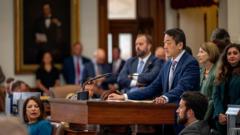Republicans in the Senate are advancing a controversial measure as part of President Trump’s sweeping domestic policy package that would effectively abolish fuel efficiency compliance requirements that have been in effect for nearly five decades. The proposed legislation would eliminate financial penalties for automakers that do not meet federal Corporate Average Fuel Economy (CAFE) standards, which have been designed since 1975 to mandate improvements in the mileage of new cars and light trucks.
Environmental advocates are alarmed by the implications of this provision, fearing that it could lead to increased gasoline consumption, soaring fuel prices, and heightened pollution from vehicle emissions. Daniel Becker, director of the Safe Climate Transport Campaign at the Center for Biological Diversity, expressed concerns that the absence of penalties for non-compliance could lead manufacturers to produce more gas-guzzling vehicles without any fear of financial repercussions.
While major automakers like General Motors and Stellantis have welcomed the Republican initiative, seeing it as a relief from potential fines amounting to hundreds of millions, critics argue that the move disproportionately disadvantages those companies—such as Toyota—that have made significant investments in fuel-efficient technologies. Toyota, however, has opted not to comment on the unfolding situation.
Democratic senators have attempted to challenge the viability of this measure, engaging with the Senate parliamentarian—an impartial arbiter of chamber rules—to determine its inclusion within the larger bill. As Republicans strive to pass the legislation with a simple majority and sidestep a filibuster, the bill’s scope remains tightly confined to issues directly impacting federal spending, ensuring no additions to long-term deficits.
With the potential future of fuel economy regulations hanging in the balance, the debate over this proposed measure encapsulates broader tensions surrounding environmental policy and technological innovation in the automotive industry.




















